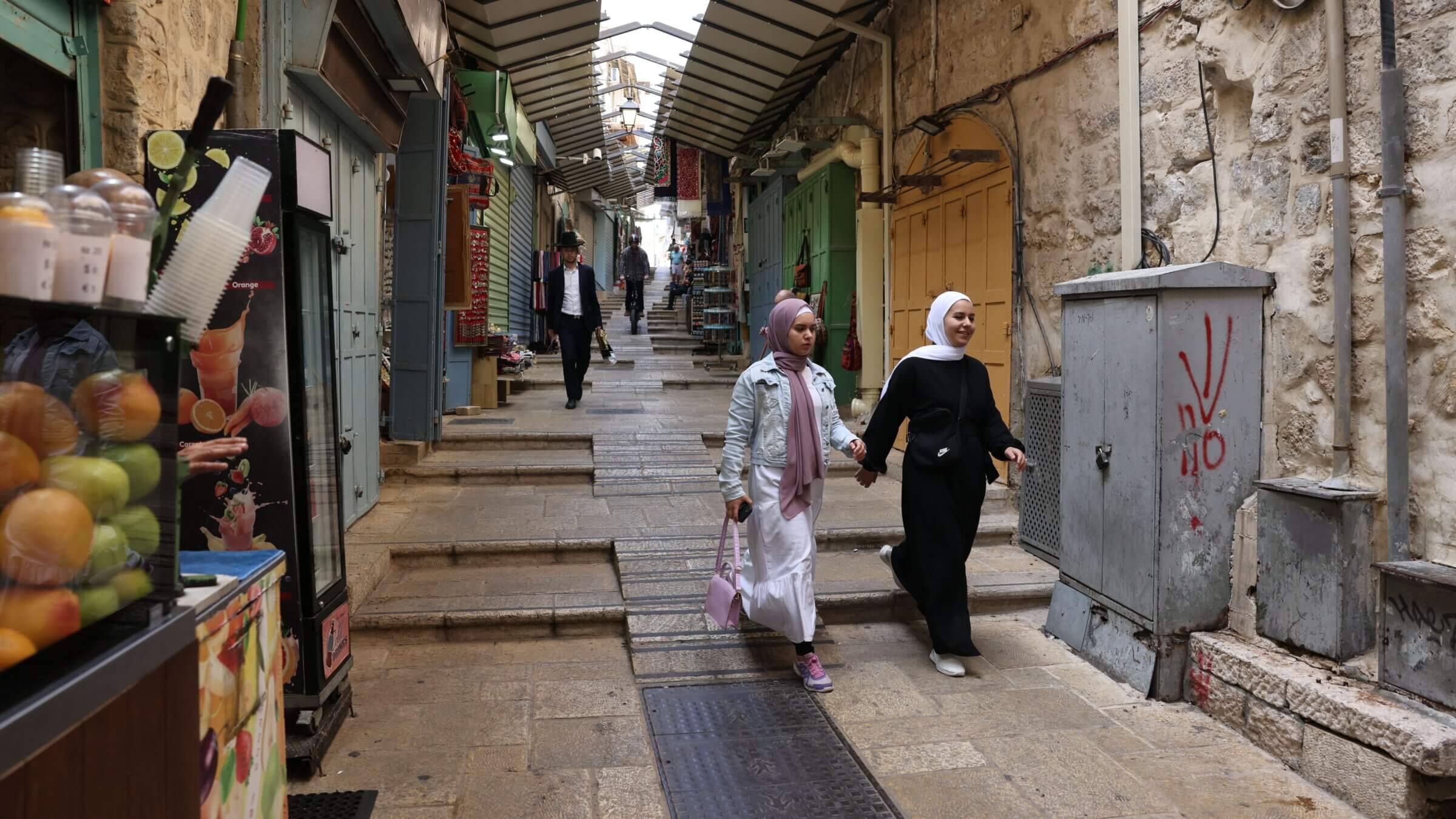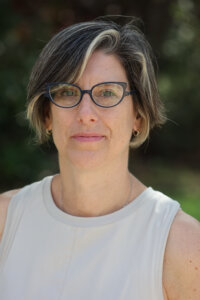In Jerusalem, Arab citizens are less visible now. Do they hate us?
I feel safest here, despite the Israel-hating wolves at our borders

Two women in traditional Muslim garb walk through the alleys of Old Jerusalem Oct. 11. Most shops have been closed due to the ongoing war. Israeli cities have been eerily quiet and tense, with some residents noting a growing sense of fear and distrust between Jews and members of the Arab-Israeli minority. Photo by Ahmad Gharabli/AFP via Getty Images
JERUSALEM — A friend told me that when she was dropping her daughter off at preschool here in Jerusalem the other day, some of the other parents were freaking out about the Arab men they saw working on the grounds. The parents wanted to call the police; my friend brought the workers some cookies instead.
They didn’t eat the cookies, but my friend thought they appreciated the gesture. And who knows. Are they Hamas supporters? Do they hate us? And if they do, is it because we’re Israeli — or because we’re Jewish?
I’ve been thinking, these last few days and weeks, how lucky I am to have never been the subject of an antisemitic act. Maybe it’s because I grew up in a relative bubble, a heavily Jewish suburb on Long Island, and made aliyah to Jerusalem 29 years ago. I struggle to recall an incident where I felt threatened as a Jew.
And so I am somewhat stunned by the prevalence of anti-Israeli and antisemitic rhetoric — and actions — I now see all around me. Somehow, the Oct. 7 massacre in which 2,500 Hamas terrorists invaded Israel to slaughter 1,400 people and abduct another 243 has opened the gates of Jew-hatred, seemingly making any statement or act possible.
My colleagues at The Times of Israel are trying to make sense of what happened in Dagestan, a town in southern Russia that is home to many Palestinian expats, where protesters stormed the airport and tried to attack a plane arriving from Israel. Turns out that flight was carrying Russians returning from medical treatments in Israel, but the mob was nonetheless ready to tear their limbs out.
I glance at social media and see riots on college campuses replete with pro-Hamas rhetoric and the shouts for Jewish extermination.
I’m protected from much of this bile here in Jerusalem, capital of the Jewish state, but even here, there’s that strong sense of Israel-hating wolves breathing down our necks at the borders. And there are increasingly uneasy interactions with our Arab neighbors, who live in the towns and villages next to my own.
Palestinian citizens of Israel are not as visible since the war. The construction sites where many of them work have been still. I see fewer sanitation teams on the street, and I know that restaurants and old-age homes, supermarkets and other shops that have many Arab workers are understaffed for the moment.
There is a family team that usually cleans our apartment building and others nearby; in recent weeks, it’s the father, not his teenage sons, who comes to clean. I see a street cleaner I recognize taking a break on a park bench while I walk my dog, and we nod warily at one another. I think about my friend who brought cookies to the Arab workers at her daughter’s preschool.
We see each other and live near each other and shop in the same markets and drive on the same streets, but we don’t interact. We don’t call each other names, but I have no idea if the hatred is there, seething beneath the surface — or if we really are just trying to each go about our business and survive this thing.
After all, the rockets launched from Gaza could just as easily hit one of their houses as it could mine.
Do I have more to worry about than my friends in the United States and Europe? I certainly have to think about those rockets, although less so here in Jerusalem. And if things heat up in Gaza with Israel’s ground offensive, and simultaneously in the north and the West Bank, then I’m not sure what it will feel like.
Plus we have all these people to mourn, and — at the latest count — 243 captives to try and bring home, and the trauma that’s been inflicted upon thousands of people in this country.
Yet, the more we dig into this situation, the less I feel that I’d like to be somewhere else right now. Sure, I dream about places I’ve been — the Rockies or the Dolomites, the rolling hills of Tuscany or my beloved Pocono mountains — but I don’t dream of escaping this place.
I feel safest here, and isn’t that odd?
I think we all want to stay where we are, wherever that is, despite the threats that may surround us or show up on a regular basis. For me, it feels reassuring to still want to be here, in Israel, despite everything that’s taken place and is still yet to come.
Maybe what we all want and need is to fight and defend our spaces, wherever they are, and perhaps that’s what we’re all doing right now.
This essay was adapted from the author’s Substack newsletter.

















